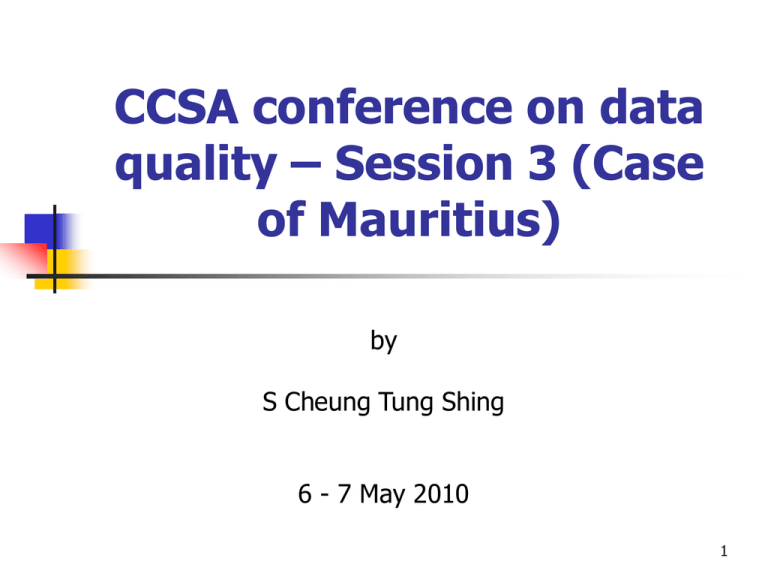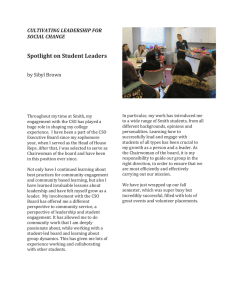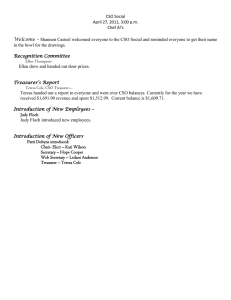CCSA conference on data quality – Session 3 (Case of Mauritius) by
advertisement

CCSA conference on data quality – Session 3 (Case of Mauritius) by S Cheung Tung Shing 6 - 7 May 2010 1 Importance of quality at the Central Statistical Office The Central Statistics Office (CSO) main producer of statistics in Mauritius. plays an essential role in the production and dissemination of statistical information. The credibility in fulfilling this key role rests on its capacity to produce high quality relevant statistical information while being cost efficient and maintaining confidentiality of personal information . Hub of the NSS central role in the evaluation and improvement of quality of data produced in the System. 2 Data Quality Framework No framework in place but the quality of the statistics produced by the CSO meets international standards. Activities carried out to adhere to the 10 UN fundamental principles of official statistics. 3 UN Principle 1: Relevance, Impartiality and Equal Access Relevance: Review of Statistical programmes to ensure that statistics produced are demand-driven. Consultations with users through meetings of the Council and its Technical Committees. User surveys to assess satisfaction with our products and also to request needs of users. Impartiality and equal access: Our statistics inform debate without advocating a particular position. They are released simultaneously to all users on scheduled dates that appear on an advance release calendar posted on our website at the beginning of each year. All statistics produced, including publications are posted on CSO’s website where they can be accessed free of charge. 4 UN Principle 2: Professional Standards and Ethics In the discharge of his functions, the Director is not subject to the direction or control of any other person or authority. Only strictly professional considerations dictate the methods and procedures for the collection, processing, storage and presentation of statistics produced by the CSO. 5 UN Principle 3: Accountability and transparency Provide information on the sources, methods and procedures used. Users informed about limitations and major changes in concepts and methods which may affect comparability over time. IMF ROSC mission in 2001 and 2007. Posting on CSO website methodology using the IMF DQAF format. Proposed: CSO to publish a list of official statistics every year and ensure that an assessment of the quality of official statistics is carried out by an independent and competent body at least once every 3 years. 6 UN Principle 4: Prevention of misuse In Statistics Act 2000, the Council may issue public statements on any matter after consultation with the organisation involved. Proposed to amend the Act so that the Director may comment on erroneous interpretation and misuse of statistics published by CSO. 7 UN Principle 5: Cost effectiveness The judicious choice of our inputs is the foundation of our statistical system: use of administrative sources of data, wherever available, to reduce cost and response burden. recourse to primary sources of data collection when administrative records do not exist or are not relevant. Extensive use of IT for data collection, processing, analysis and dissemination for cost reduction at all levels. The office is implementing an e-Business planto put in place a centralized database linking data from different sources and to provide a networked environment for effective sharing and analysis of data at lower cost. Propose to recruit multi-disciplinary professional and CSO would be in a better position to do more analytical work without additional cost. 8 UN Principle 6: Confidentiality Individual information is treated in strict confidence through the following safeguards: Not enter individual names of persons in our databases. Not publish individual data and data for small categories that allows identification. Release individual data for research or statistical purposes only and in such a way that does not enable the identification of the particular person or establishment. Elaborate steps are taken to ensure that these conditions are met. Adhere to professional ethics – all our officers take an oath of secrecy that they will not divulge any individual information. Penalties are provided for in the Statistics Act regarding any breach of confidentiality 9 UN Principle 7: Legislation Statistics Act first passed in April 1951. Replaced by a modern one, the Statistics Act 2000 in April 2001. In the process of amending the Statistics Act to cater for coordination of the NSS and enhance the independence of the Director of statistics in the execution of his duties. 10 UN Principle 8: Coordination among statistical agencies within the country NSDS published in 2006 to revisit Statistical System and strengthen coordination among producers of statistics, All stakeholders were involved in the process. MOU with the Central Bank with a view to: promote quality statistics, avoid overlapping and duplication in the collection and production of statistical information, meet international obligations, collaborate in the development and implementation of best practices and develop methodologies in areas of mutual interest. MOU/official working arrangements with other organizations are being made. 11 UN Principle 9: Use of International Concepts, Classifications and Methods To ensure good quality and international comparability of data, use of international recommendations such as: SNA ISIC ISCO ISCED SITC CPC GFS ILO recommendations on Labour Statistics and CPI 12 UN Principle 10: International and regional co-operation Participates actively in international and regional projects for bilateral and multilateral cooperation in the domain of statistics (e.g ICP). Request advice on pertinent methodological issues from regional and international organizations. This contributes to improvement of official statistics. Cooperate with international and regional bodies such as (i) UN, (ii) IMF, (iii) World Bank, (iv) ILO, (v) ECA, (vi) AfDB, (vii) SADC and (viii) COMESA13. Need for a Data Quality Framework (DQF) As from next year, it is planned that the CSO will publish every year a list of Official statistics. There is need to evaluate the statistics that are produced in the NSS. Evaluation of statistics will require a rational, transparent and sustainable framework for assessing the quality of statistics published. The office would therefore need to develop a Data Quality Framework (DQF) this year. This DQF will: enhance and extend transparency in data evaluation as it will call on all producers of statistics to be transparent in informing users of the concepts, definitions, classifications, methodologies, and frames used in collecting, processing and analysing their data Inform users on the accuracy of the data, and any other features that may affect the quality of the data. 14 Help needed for CSO to develop a DQF Intend to use DQF already developed by other countries/organisations such as Canada, UK, South Africa and OECD. Need technical assistance to advise on the template to adopt, procedures to follow to design a DQF processes involved for assessment of statistics. how to get all stakeholders on board during the design stage as DQF will concern other data producers. This will ensure their collaboration for implementation. Alternatively, if the UN intends to pilot its generic framework, Mauritius could be among the countries where the exercise can be carried out. 15



